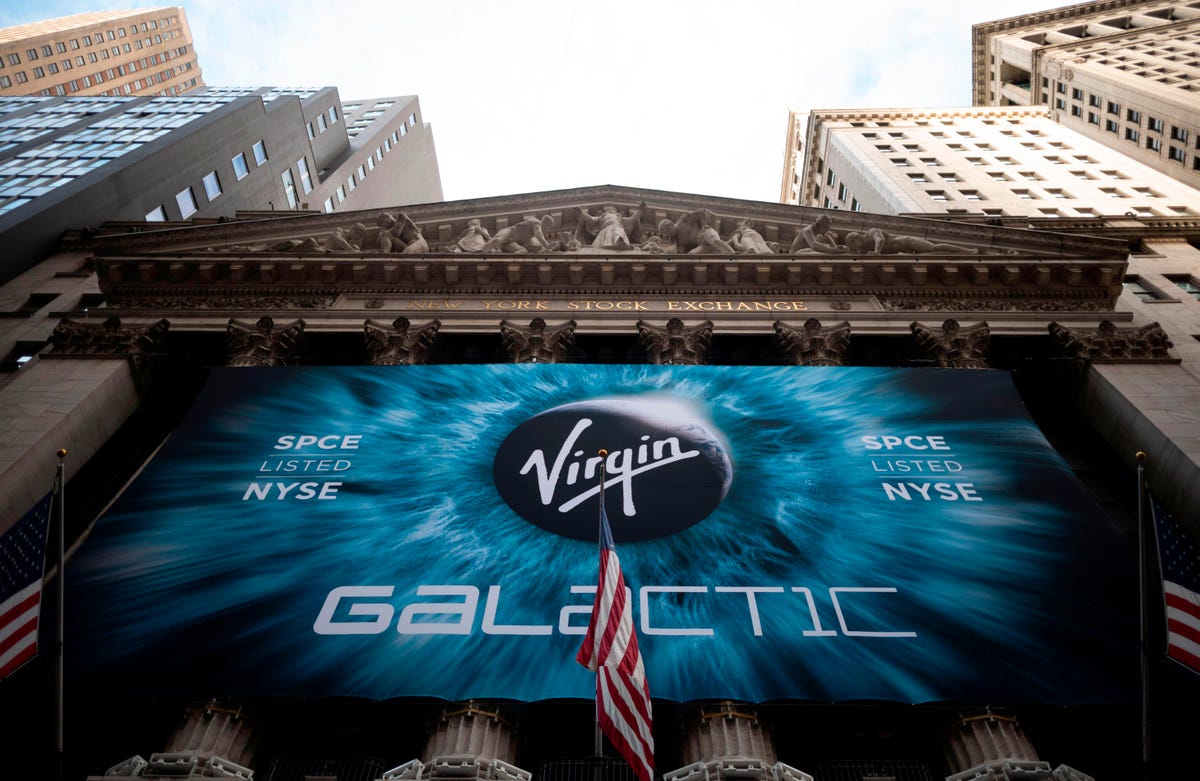

TOPSHOT – A logo of a Virgin Galactic is seen outside the building during the company’s first day of … [+]
Our theme of Space Stocks has underperformed this year, declining 7% year-to-date, compared to a return of almost 18% on the S&P 500. However, there have been a couple of notable developments in the space sector in recent weeks. Elon Musk backed SpaceX saw its valuation soar to over $100 billion last week as the company made an agreement to sell stock from company insiders. This would make SpaceX the world’s second most valuable private company after China’s Bytedance. Moreover, Jeff Bezos’ BlueOrigin successfully launched the second crewed mission of its New Shepard rocket on Wednesday. These high-profile developments could bode well for publicly listed stocks with exposure to the space theme. As we’ve noted before, the longer-term outlook for the theme also appears promising, given the shift from government-driven space programs toward enterprise-backed programs and the emergence of a host of space-related opportunities such as reusable rockets, space tourism, and satellite-based Internet.
While all the stocks in our theme have meaningfully underperformed the broader markets, Lockheed Martin has been the best performer, with its stock up 2% year-to-date. On the other side, Maxar Technologies has been the worst performer, with its stock down by about 22% year-to-date.
[7/15/2021] Virgin Galactic
SPCE
AJRD
Our theme of Space Stocks has underperformed this year, rising by just about 8% year-to-date, compared to a return of over 17% for the S&P 500. That said, things could look up for these stocks. July is turning out to be an eventful month for the space industry. Earlier this month, Virgin Galactic (NYSE: SPCE) successfully completed its first fully-crewed test flight, which carried its founder Richard Branson to space. Separately, privately held startup Blue Origin plans to fly its founder, e-commerce billionaire Jeff Bezos as part of its first crewed flight on its New Shepard rocket ship on July 20th. These high-profile trips are likely to create a lot of buzz for the space industry, turning the focus on publicly listed space stocks in the near term. The longer-term outlook for the sector also looks promising, given the shift from government-driven space programs toward enterprise-backed programs and the emergence of a host of space-related opportunities including reusable rockets, satellite-based Internet, and point-to-point transport. Virgin Galactic has been the strongest performer within our theme, rising by about 39% year-to-date. On the other side, Aerojet Rocketdyne was the worst performer, with its stock down by roughly 11% year-to-date.
View our Space Stocks theme for the complete list of companies and an overview of their financial performance.
[8/10/2020]
Investor interest in the space exploration area has been rising after Elon Musk’s SpaceX’s successfully completed its first manned mission this year. There are a couple of broad trends driving the industry. Firstly, there is a gradual shift from government-driven space programs toward enterprise-backed programs. Moreover, new markets appear to be opening up, ranging from reusable rockets, satellite-based Internet, space travel, and point-to-point transport around the earth. Per Morgan Stanley
MS
Although SpaceX remains privately held, we’ve picked a theme of a few publicly listed space companies including Lockheed Martin (NYSE: LMT), Aerojet Rocketdyne (NYSE: AJRD), Iridium (NASDAQ: IRDM), and Virgin Galactic as part of our theme Space Stocks To Watch. Parts of the analysis are summarized below.
Lockheed Martin ($108 billion market cap, +0% YTD), is a diversified aerospace company that also makes satellites and space craft for government and commercial customers. The company is developing the Orion spacecraft that is intended to be used in NASA’s human spaceflight programs that will venture into deep space and lunar orbit. The company also provides launch services under the United Launch Alliance partnership with Boeing
BA
Virgin Galactic ($4 billion, +55%) is an aerospace company focused on suborbital spaceflight for private individuals and researchers. While the company is currently in the test phases and doesn’t generate meaningful revenues just yet, things are likely to change in the next few quarters, as it likely begins commercial space flights carrying paying space tourists from 2021, charging each passenger roughly $250,000.
Aerojet Rocketdyne ($3.4 billion, -7%) is an American rocket and missile propulsion manufacturer. While the company derives more than half its revenues from missile defense systems, its space business is also poised to grow considering its contracts with Boeing’s SLS rocket, Northrop’s
NOC
Iridium Communications ($4 billion, +20%) operates a constellation of satellites that are used for worldwide voice and data communication from hand-held satellite phones and other devices. The company essentially provides communication services across the world, even in areas where there is no cellphone coverage. Iridium largely caters to governments and private sector companies including maritime and aviation solutions.
What if you’re looking for a more balanced portfolio instead? Here’s a high-quality portfolio that’s beaten the market consistently since 2016.
Invest with Trefis Market-Beating Portfolios
See all Trefis Price Estimates
24World Media does not take any responsibility of the information you see on this page. The content this page contains is from independent third-party content provider. If you have any concerns regarding the content, please free to write us here: contact@24worldmedia.com

A Brief Look at the History of Telematics and Vehicles

Tips for Helping Your Students Learn More Efficiently

How To Diagnose Common Diesel Engine Problems Like a Pro

4 Common Myths About Wildland Firefighting Debunked

Is It Possible To Modernize Off-Grid Living?

4 Advantages of Owning Your Own Dump Truck

5 Characteristics of Truth and Consequences in NM

How To Make Your Wedding More Accessible

Ensure Large-Format Printing Success With These Tips

4 Reasons To Consider an Artificial Lawn

The Importance of Industrial Bearings in Manufacturing

5 Tips for Getting Your First Product Out the Door